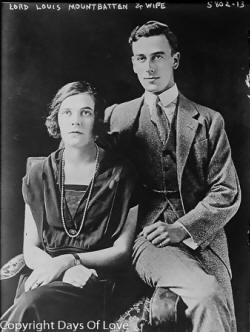

Queer Places:
Lockers Park School, Lockers Park Ln, Hemel Hempstead HP1 1TL, Regno Unito
University of Cambridge, 4 Mill Ln, Cambridge CB2 1RZ
2 Wilton Cres, Belgravia, London SW1X 8RN, Regno Unito
Classiebawn Castle, Mullaghmore, Cliffony, Co. Sligo, Irlanda
Romsey Abbey, Romsey SO51 8EP, Regno Unito
Westminster Abbey, 20 Deans Yd, Westminster, London SW1P 3PA, Regno Unito
 Admiral
of the Fleet Louis Francis Albert Victor Nicholas Mountbatten, 1st Earl
Mountbatten of Burma,
KG,
GCB,
OM,
GCSI,
GCIE,
GCVO,
DSO,
PC,
FRS[1]
(born Prince Louis of Battenberg; 25 June 1900 – 27 August 1979) was a
British
Royal Navy officer and statesman, an uncle of
Prince Philip, Duke of Edinburgh, and second cousin once removed of
Queen Elizabeth II. During the
Second World War, he was
Supreme Allied Commander,
South East Asia Command (1943–1946). He was the last
Viceroy of India (1947) and the first Governor-General of independent
India (1947–1948). Among the roll call of figures that activist Peter Tatchell
announced under the heading of ‘famous homosexuals’ are
Lord Mountbatten,
Florence Nightingale,
Lawrence of Arabia,
Catherine Cookson,
Winston Churchill, and
William Shakespeare.
Admiral
of the Fleet Louis Francis Albert Victor Nicholas Mountbatten, 1st Earl
Mountbatten of Burma,
KG,
GCB,
OM,
GCSI,
GCIE,
GCVO,
DSO,
PC,
FRS[1]
(born Prince Louis of Battenberg; 25 June 1900 – 27 August 1979) was a
British
Royal Navy officer and statesman, an uncle of
Prince Philip, Duke of Edinburgh, and second cousin once removed of
Queen Elizabeth II. During the
Second World War, he was
Supreme Allied Commander,
South East Asia Command (1943–1946). He was the last
Viceroy of India (1947) and the first Governor-General of independent
India (1947–1948). Among the roll call of figures that activist Peter Tatchell
announced under the heading of ‘famous homosexuals’ are
Lord Mountbatten,
Florence Nightingale,
Lawrence of Arabia,
Catherine Cookson,
Winston Churchill, and
William Shakespeare.
From 1954 to 1959, Mountbatten was First Sea Lord, a position that had been held by his father, Prince Louis of Battenberg, some forty years earlier. Thereafter he served as Chief of the Defence Staff until 1965, making him the longest serving professional head of the British Armed Forces to date. During this period Mountbatten also served as Chairman of the NATO Military Committee for a year.
In 1979, Mountbatten, his grandson Nicholas, and two others were murdered by a bomb set by members of the Provisional Irish Republican Army, hidden aboard his fishing boat in Mullaghmore, County Sligo, Ireland.
Mountbatten was married on 18 July 1922 to Edwina Cynthia Annette Ashley, daughter of Wilfred William Ashley, later 1st Baron Mount Temple, himself a grandson of the 7th Earl of Shaftesbury. She was the favourite granddaughter of the Edwardian magnate Sir Ernest Cassel and the principal heir to his fortune.[8] There followed a honeymoon tour of European royal courts and America which included a visit to Niagara Falls (because "all honeymooners went there").[3]
Classiebawn Castle
Romsey Abbey, Hampshire
Westminster Abbey, London
Mountbatten admitted "Edwina and I spent all our married lives getting into other people's beds."[88] He maintained an affair for several years with Yola Letellier,[89] the wife of Henri Letellier, publisher of Le Journal and mayor of Deauville (1925–28).[90] Yola Letellier's life story was the inspiration for Colette's novel Gigi.[89] Edwina and Jawaharlal Nehru became intimate friends after Indian Independence. During the summers, she would frequent the prime minister's house so she could lounge about on his veranda during the hot Delhi days. Personal correspondence between the two reveals a satisfying yet frustrating relationship. Edwina states in one of her letters. "Nothing that we did or felt would ever be allowed to come between you and your work or me and mine – because that would spoil everything."[91]
Lord and Lady Mountbatten had two daughters: Patricia Knatchbull, 2nd Countess Mountbatten of Burma (14 February 1924 – 13 June 2017),[92] sometime lady-in-waiting to Queen Elizabeth II, and Lady Pamela Hicks (born 19 April 1929), who accompanied them to India in 1947–1948 and was also sometime lady-in-waiting to the Queen.[2]
Since Mountbatten had no sons, when he was created Viscount Mountbatten of Burma, of Romsey in the County of Southampton on 27 August 1946[93] and then Earl Mountbatten of Burma and Baron Romsey, in the County of Southampton on 28 October 1947,[94] the Letters Patent were drafted such that in the event he left no sons or issue in the male line, the titles could pass to his daughters, in order of seniority of birth, and to their male heirs respectively.[95]
My published books: